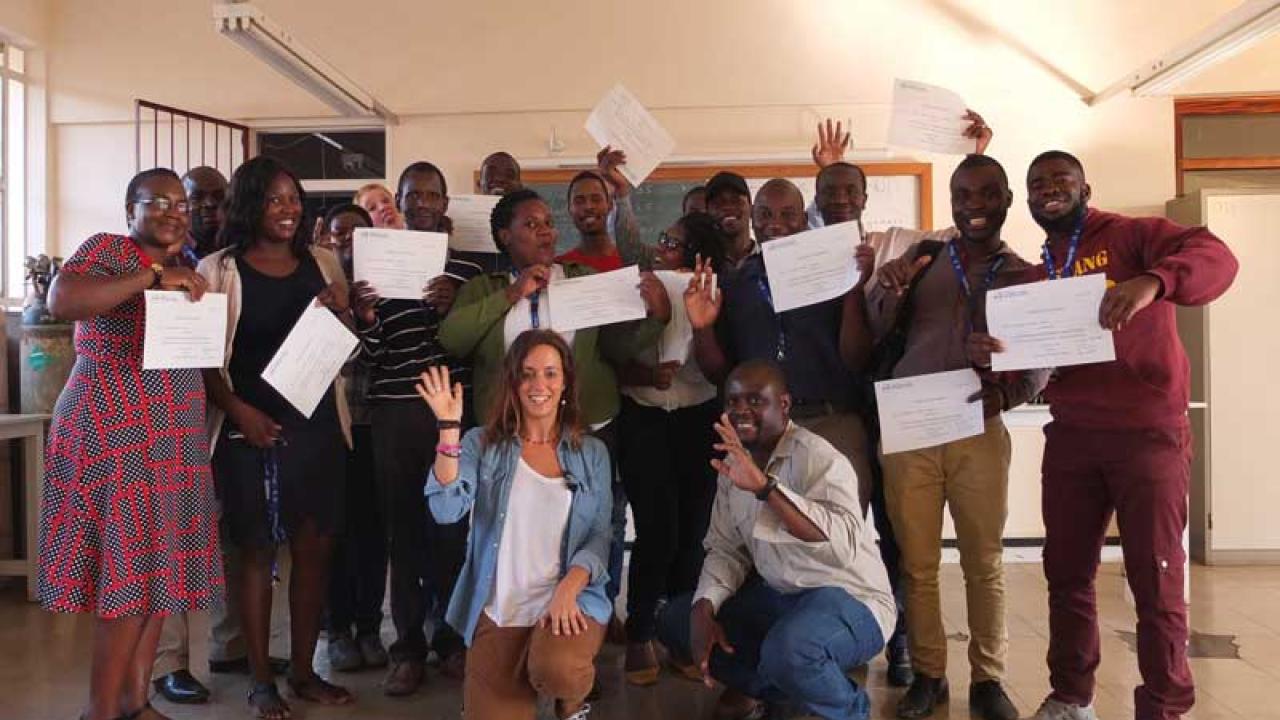
Humans have drastically altered Earth’s climate patterns, instigating changes that will continue for centuries to come. Developing countries are disproportionately affected by climate change, so it is vital that populations there can prepare for the future through climate education. Recently, a team of young climatologists and earth scientists with connections to ICTP visited universities around Zimbabwe, bringing one-day Physics Without Frontiers masterclasses in Earth systems physics to students at four universities, encouraging students to be curious about the planet and possibly become researchers themselves.
Under the auspices of ICTP's Physics Without Frontiers (PWF) programme, this science roadshow featured five Earth system physics scientists, including two postdoctoral fellows from ICTP, Rita Nogherotto and Taleena Sines. In morning and afternoon sessions, the team walked students through the fundamentals and open questions of weather forecasting, aerosols and the atmosphere, climate modeling, and seismology. Students then got to engage with a climate modeling activity, exploring scenarios with different levels of carbon dioxide in the atmosphere. The day wrapped with presentations about career opportunities in Earth system physics, and each student received a certificate of completion after this intense training, as well as the contact details of all the scientists in case they wanted more information or to collaborate.
 PWF connects enthusiastic scientists with universities that are interested in hosting roadshows, courses, or masterclasses. The Zimbabwe roadshow was one of the first beyond PWF's traditional focus on particle physics. In all the activities, a team of scientists, usually led by a researcher hailing from the host country, volunteers their time and expertise for a scientific community that may be interested in developing that particular subfield locally. Or, if the local scientific community is thriving, roadshows focus on outreach programmes, involving younger students, the general community, and sometimes policy makers as well. Each PWF activity is designed for and by the community that hosts it, bringing researchers from all over the world to help spread science enthusiasm.
PWF connects enthusiastic scientists with universities that are interested in hosting roadshows, courses, or masterclasses. The Zimbabwe roadshow was one of the first beyond PWF's traditional focus on particle physics. In all the activities, a team of scientists, usually led by a researcher hailing from the host country, volunteers their time and expertise for a scientific community that may be interested in developing that particular subfield locally. Or, if the local scientific community is thriving, roadshows focus on outreach programmes, involving younger students, the general community, and sometimes policy makers as well. Each PWF activity is designed for and by the community that hosts it, bringing researchers from all over the world to help spread science enthusiasm.
That was the goal of Innocent Kudzotsa, who is a former student of ICTP’s Diploma Programme in Earth system physics. He has since received a PhD in atmospheric physics, taught at his alma mater the University of Zimbabwe, and is now a postdoctoral fellow at the Finnish Meteorological Institute studying aerosol-cloud interactions. Kudzotsa introduced students to his field and research, and was the team leader who recruited four other scientists for the roadshow.
After hearing from the scientists, students grouped around computers to explore the effects of different carbon dioxide emission levels on the Earth’s average temperature in a hands-on session with a simple online model. Using the model, students were able to increase or decrease carbon dioxide emissions, and move time scales. The model let students explore how the Earth is affected by various scenarios, from society being able to adapt and reduce emissions in the near future to continuing “business as usual” and increasing emissions.
The proposal for this roadshow highlighted the lack of awareness many physics students have about some physics disciplines, including Earth system physics. “Many students are limited to a few established branches of physics such as medical physics, nanophysics, or astronomy, which are now common in the Zimbabwe," says Kudzotsa. "Moreover, Earth system physics research in the country needs to be developed and established here in order to address some of the growing challenges imposed on the country and the region by climate change.”
At each university, Zimbabwean meteorologist Linia Mashawi kicked off the theory masterclasses with the basic principles of meteorology and many of the different techniques and tools used in weather forecasting. She recently completed her master’s degree in applied meteorology at the University of Reading in the United Kingdom, and helped students dive into this new field. Another team member, Brassnavy Manzunzu, talked to students about seismology and earthquake hazard analysis. A PhD student in seismology at the University of Witwatersrand, one of the universities the roadshow stopped at, Manzunzu covered plate tectonics and seismic wave measurements. To round out the introduction to Earth system physics, Nogherotto and Sines did a joint session on climate and climate modeling, focusing on the physics of Earth's climate, looking at its complexity and its fragility.
The programme was received overwhelmingly well and there has been a number of follow-up emails from both students and lecturers seeking further guidance, assistance and collaborations. “The roadshow was an amazing experience,” says Nogherotto. “I really loved the students, their enthusiasm, their need for new inputs and new possibilities.”
Read more on ICTP-PWF's Facebook page.
---- Kelsey Calhoun
















